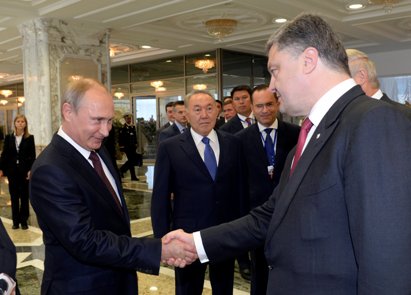
Russian President Vladimir Putin has signed a new military doctrine, naming NATO expansion among key external risks, the Kremlin said on Friday, days after Ukraine made fresh steps to join the Atlantic military alliance.
Moscow's previous military doctrine, signed by Putin in 2010, also identified NATO expansion as a top risk to Russia, but the stakes have risen sharply over the past year.
Russia said this week NATO was turning Ukraine into a "frontline of confrontation" and threatened to sever remaining ties if Ukraine's hopes of joining NATO were realized.
The Kiev parliament's renunciation of Ukraine's neutral status on Tuesday in pursuit of NATO membership has outraged Moscow and deepened the worst confrontation between Russia and the West since the end of the Cold War after Russia's annexation of Ukraine's Crimea peninsula this year.
NATO has already boosted its military presence in eastern Europe this year, saying it has evidence that Russia orchestrated and armed a pro-Russian rebellion in eastern Ukraine that followed the overthrow of a Kremlin-backed president in Kiev.
Moscow denies supporting the rebellion, and is currently trying, along with Kiev and the rebels, to renew efforts to find a political solution to the crisis in eastern Ukraine.
It is likely to take years for Ukraine to meet the technical criteria for accession to NATO and, even then, there is no certainty that the alliance is ready to take such a decision.
A NATO official said on Friday the alliance respected the move by Ukraine's parliament, and so should Russia.
"Should Ukraine decide to apply for NATO membership, NATO will assess its readiness to join the Alliance in the same way as with any candidate. This is an issue between NATO and the individual countries aspiring to membership."
Reuters
Kiev and rebels to exchange hundreds of prisoners soon: security
Kiev and pro-Russian separatists will exchange hundreds of prisoners soon, an aide to the head of Ukraine's SBU state security service said on Friday, as the military reported a slight increase in rebel attacks.
The agreement to swap 125 Ukrainian servicemen for 225 rebels held by Kiev followed peace talks between envoys of Ukraine, Russia, the separatists and European security watchdog OSCE on Wednesday.
"We've prepared 225 people, which we will hand over. The main thing is for this not to fall through now," the SBU's Markiyan Lubkyvsky told Reuters by telephone.
The uprising by separatists began a month after Russia annexed the Black Sea peninsula of Crimea from Ukraine in March, following the popular overthrow of Ukraine's Moscow-backed president, and has killed more than 4,700 people.
The pro-Western government in Kiev accuses Russia of orchestrating the rebellion in Ukraine's east, a charge denied by Moscow.
Exchanging prisoners is one of the criteria of a 12-point peace protocol, which also includes a ceasefire, agreed by Kiev and rebels in September. But most of the plan has not yet been implemented due to repeated violations of the ceasefire and because separatists defied Kiev by holding leadership elections.
Ukraine's Interfax news agency quoted a rebel representative as saying the prisoners would be swapped by Dec. 30. Lubkyvsky did not confirm this date, but said the exchange would happen "soon".
It is not known exactly how many prisoners are currently held by the two sides, but Ukraine's military said this month around 600 Ukrainians were in rebel hands.
Around 1,300 people have been killed since the ceasefire was agreed in September, according to the United Nations, but the fighting has lessened significantly in December.
On Friday, however, the military said rebels had slightly stepped up their attacks on Ukrainian positions in the east of the country.
"In the past two days, (rebel) fighters started using artillery and GRAD rocket launchers. Attacks have intensified to a minor extent," military spokesman Andriy Lysenko told Reuters by phone.
Reuters


























